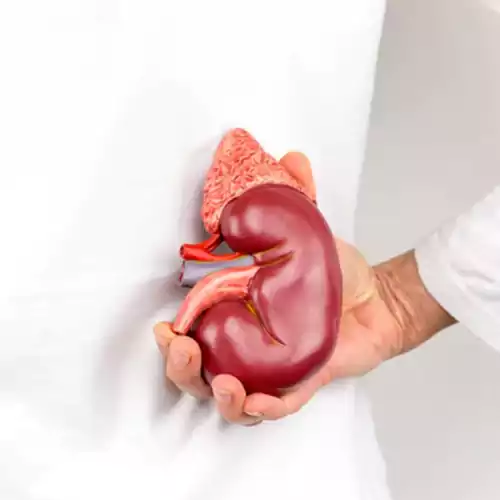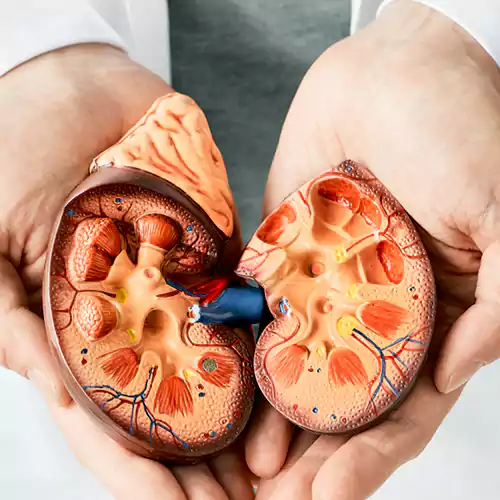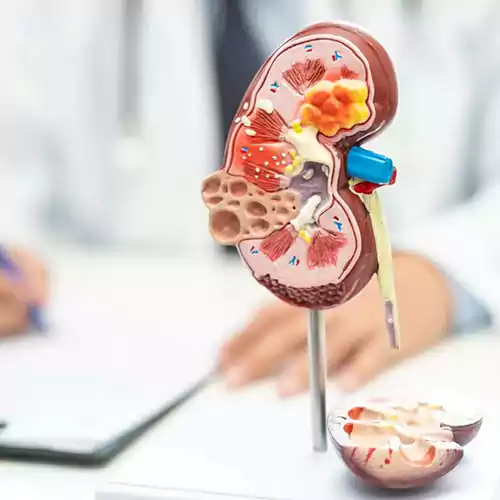Kidney transplant in Nashik involves the extraction of a kidney from a healthy individual, either deceased or live, for patients with chronic end-stage renal failure. The procedure, performed by a skilled kidney transplant surgeon, includes three critical anastomoses: arterial, venous, and urinary. Lasting about 3-4 hours, it restores renal function, enabling a normal life. However, lifelong immunosuppressive medication and regular medical check-ups from a kidney transplant doctor are necessary to prevent rejection.


In all patients with end-stage chronic renal failure and without contraindications, prior to the start of dialysis or once included in hemodialysis or peritoneal dialysis program. It requires the performance of a series of analytical, immunological studies, various imaging techniques, assessment of cardiac, pulmonary, neurological, urological, etc., being subsequently included in the waiting list for kidney transplantation in the transplant unit of your area of influence.
At present, the results of renal corpse transplantation are very good, achieving graft survival of around 90% per year, 70–75% at five years, and 50–60% at 10 years. The main causes of long-term graft loss are chronic rejection and death of a patient with a functioning graft in relation to cardiovascular problems, infections, tumors, and liver disease. The results of renal transplantation of living donors are higher than those of cadavers and are characterized by a lower incidence of acute rejection and superior results in terms of graft survival that can be 98% per year after five years of 85% and at 10 years of 75%.

Not all patients with terminal chronic renal failure can be transplanted due to problems or limitations of a medical or surgical nature. This is the case of patients older than 70–75 years (valuing biological age rather than chronological age) and those with significant problems of cardiac, hepatic, neurological, pulmonary origin, or chronicinfectious pathology, unresolved tumor diseases, etc.
A kidney transplant is an operation to put a healthy kidney (from a donor) inside the body. There are two types of donors:
Live donors: A living donor can be a relative, a friend, a co-worker, or any other person who is willing to give a kidney to someone who needs it. A person only needs a healthy kidney to live.
Dead donors: A dead donor is someone who has recently died.
You may need to have tests to see if the donated kidney is compatible with your type of tissue and blood type. Good tissue compatibility reduces the chances of your body rejecting the new kidney. They will also evaluate you to make sure you do not have significant heart or lung disease or other diseases, such as cancer, that could reduce your life expectancy.
Kidney transplant surgery usually lasts about 3 hours. During the surgery, you will place the donated kidney in the lower abdomen, connect the blood vessels of the donated kidney to the arteries and veins of your body, and connect the kidney ureter donated to the bladder. The blood can then flow through the new kidney, and the kidney will begin to filter and eliminate waste and produce urine.
The new kidney usually starts working immediately. In most cases, diseased or damaged kidneys are not removed unless you have a severe kidney infection (pyelonephritis), kidney cancer, nephrotic syndrome, or extremely large polycystic kidneys.
You will have to stay in the hospital for several days after receiving the new kidney. In some cases, it may take time for the new kidney to produce urine. Therefore, you may have to undergo dialysis and take medications, such as diuretics, to help the new kidney remove excess water and salt from the body.
After the surgery, you will have to take medications to suppress the immune system. These medications are used to help prevent the body from rejecting the new kidney. You should take these medications for the rest of your life.
During the first weeks or months after surgery, your body may try to reject the new kidney. This is called acute rejection and occurs in about 1 in 10 people in the first year after a transplant. Most of the time, acute rejection can be treated with medications to prevent rejection (immunosuppressants).
Chronic rejection (also known as the chronic failure of allotransplantation) is a gradual and progressive process of loss of renal function that can occur many months to several years after surgery. The specialists do not fully understand the cause of chronic rejection. There is no treatment for chronic rejection. Most people return to dialysis or receive a new transplant.